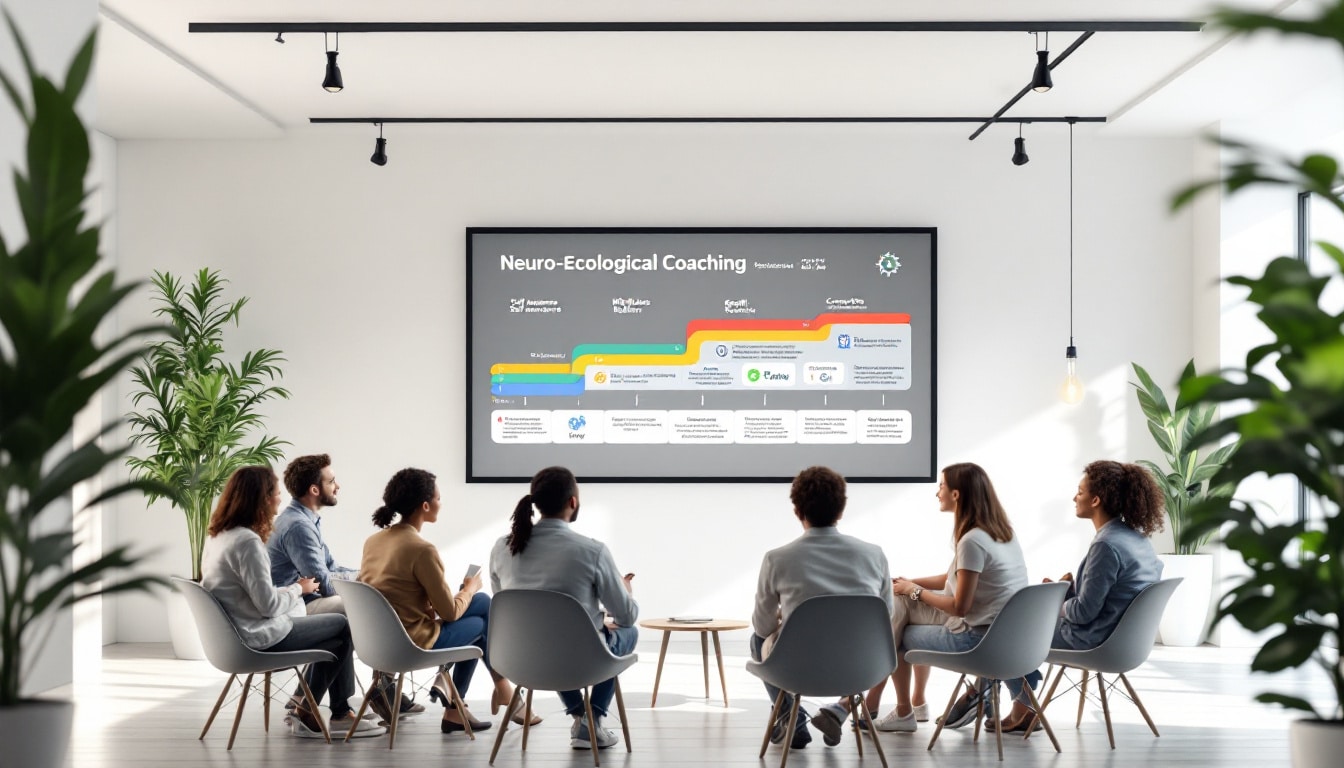Welcome to a universe where your data is at the heart of every interaction. Understanding the use of cookies is essential for navigating smoothly in the digital world. As an Executive Coach, I accompany you to master these tools and optimize your online experience.
Today, data and cookies play a crucial role in personalizing the services you use. They help to protect against threats such as spam and fraud, while measuring user engagement. By choosing to accept all options, you contribute to the development and improvement of services, as well as the dissemination of personalized content. However, if you prefer to reject certain uses, you maintain control over your privacy while benefiting from an experience tailored to your needs. Together, let’s explore the best ways to manage your privacy settings for a harmonious and effective use of modern technologies.

Presentation of the neuro-ecological coaching model
Welcome to the exciting world of neuro-ecological coaching, an innovative approach designed to optimize leadership, promote success, and enhance well-being within organizations. As a passionate Executive Coach, I developed this model in six steps to support leaders and teams towards enhanced performance and personal growth. This holistic model integrates neuroscience and ecological principles to create an environment conducive to sustainable development and achieving objectives.
The neuro-ecological coaching model in six points stands out for its ability to address the complex challenges of modern leadership. By combining proven techniques with active listening and innovative tools, this model allows for the transformation of thought patterns and behaviors, thereby fostering a positive dynamic within teams.
What are the foundations of neuro-ecological coaching?
Neuro-ecological coaching is based on a deep understanding of brain mechanisms and their influence on human behavior. By integrating neuroscience, this model explores how thoughts, emotions, and actions interact to shape leadership and performance. Ecological principles emphasize the importance of the environment in which leaders operate, highlighting the impact of interactions and relationships on well-being and success.
This multidimensional approach recognizes that each individual is unique, with their own experiences, motivations, and aspirations. By taking these differences into account, neuro-ecological coaching offers personalized support, enabling leaders to develop skills tailored to their specific needs. This personalization is essential for creating a lasting and significant impact, both at the individual and organizational levels.
Furthermore, the model emphasizes the sustainability of change, ensuring that new habits and acquired skills are smoothly integrated into daily professional life. This integration contributes to continuous growth and constant improvement in performance, thus fostering a virtuous cycle of success and well-being.
How does the six-step model enhance leadership?
The six-step model of neuro-ecological coaching provides a clear and effective structure for developing solid and inspiring leadership. Each step is designed to address a specific aspect of personal and professional development, ensuring a coherent and balanced progression.
The first step involves identifying the goals and aspirations of the leader. This fundamental phase clarifies expectations and defines a clear vision of success. By focusing on personal and organizational objectives, the coach can develop a personalized action plan aligned with the leader’s values and ambitions.
The second step, skills assessment, evaluates the leader’s strengths and areas for improvement. This thorough assessment allows for targeting key skills to develop, such as communication, stress management, or decision-making. By enhancing these skills, the leader becomes more effective and resilient in facing challenges.
The third step, developing resilience, is crucial for maintaining optimal performance in a constantly evolving environment. Neuro-ecological coaching proposes techniques for managing stress, fostering adaptability, and encouraging a positive attitude. These tools enable the leader to overcome obstacles with confidence and determination.
The fourth step, improving interpersonal relationships, emphasizes the importance of interactions within the team. By developing communication and conflict management skills, the leader can create an atmosphere of trust and collaboration. This harmony fosters better team cohesion and increased productivity.
The fifth step, implementing motivation strategies, aims to inspire and engage team members. By understanding individual needs and providing appropriate encouragement, the leader can stimulate intrinsic motivation and foster a performance culture.
Finally, the sixth step, continuous evaluation, ensures the monitoring of progress and the adjustment of strategies based on the results obtained. This evaluation guarantees that objectives are met and that the leader continues to evolve positively. This dynamic process helps maintain a high level of performance and well-being within the organization.
What are the benefits for professional success?
Adopting the neuro-ecological coaching model in six steps brings numerous advantages in terms of professional success. By developing key skills and promoting a strategic approach to leadership, this model allows leaders to stand out in a competitive environment.
A leader trained according to this model benefits from a better decision-making ability, thanks to a deep understanding of cognitive and emotional mechanisms. This ability allows for confident navigation in complex situations and making informed decisions, thus contributing to the growth and stability of the organization.
Moreover, neuro-ecological coaching enhances the ability to inspire and motivate teams. By establishing an authentic connection with team members, the leader is able to create a positive and stimulating work environment. This dynamic fosters engagement and talent retention, essential for the long-term success of the company.
Another key advantage lies in the improvement of change management. In a constantly evolving world, the ability to adapt quickly and effectively is essential. The six-step model provides the necessary tools to navigate transitions smoothly, minimizing resistance and maximizing growth opportunities.
Finally, this model fosters continuous personal growth, encouraging leaders to challenge themselves and consistently seek improvement. This quest for excellence contributes to sustained performance and enhanced professional recognition, thereby consolidating individual and collective success.
How to promote well-being at work through neuro-ecological coaching?
Well-being at work is a crucial element for ensuring optimal performance and sustainable job satisfaction. Neuro-ecological coaching integrates specific strategies to promote a healthy and balanced work environment.
One of the keys lies in effective stress management. By adopting relaxation techniques, meditation, and time management, leaders can reduce stress levels and prevent burnout. These practices promote better mental and physical health, essential for maintaining high performance.
The model also encourages the development of a positive culture within the organization. By valuing recognition, support, and open communication, the leader creates a climate of trust where employees feel supported and valued. This positive atmosphere helps strengthen motivation and reduce turnover.
Additionally, neuro-ecological coaching emphasizes the work-life balance. By helping leaders define clear boundaries and manage their time effectively, this model prevents overwork and fosters a harmonious balance between different areas of life. This balance is essential for maintaining overall well-being and job satisfaction.
By integrating these elements, neuro-ecological coaching contributes to creating a work environment where well-being is both a priority and a pillar of performance. This holistic approach ensures not only professional success but also the personal growth of individuals within the organization.
For more information, check out this detailed article on the neuro-ecological coaching model.
What are the transformative success strategies developed by Kevin Guest?
During the executive coaching day on May 1st, Kevin Guest unveiled innovative strategies for transformative success. These strategies fit perfectly within the framework of the neuro-ecological coaching model, offering practical tools for leaders looking to transform their approach and that of their teams.
One of the key strategies presented by Kevin Guest is the integration of neuroscience into leadership. Understanding how the human brain functions enables leaders to design work environments that foster engagement and creativity. This scientific approach also allows for better emotion management and more informed decision-making.
Kevin also highlighted the importance of authentic communication. By encouraging open and transparent communication, leaders can create relationships of trust and mutual respect with their teams. This authenticity strengthens cohesion and collaboration, essential for sustainable success.
In addition, he emphasized the value of emotional intelligence in leadership. Developing this skill allows leaders to better understand and manage their own emotions, as well as those of others. Emotional intelligence is a major asset for navigating complex situations and inspiring teams.
Finally, Kevin Guest stressed the necessity of continuous learning. In an ever-evolving world, staying at the forefront of trends and innovations is indispensable. The neuro-ecological coaching model encourages this quest for knowledge, allowing leaders to adapt and remain effective.
To explore these strategies further, feel free to read this article on Kevin Guest’s transformative success strategies.
How to measure the effectiveness of the neuro-ecological coaching model?
It is essential to measure the effectiveness of a coaching model to ensure its impact and continuous adaptation. The neuro-ecological coaching model proposes several indicators and methods to evaluate its performance.
First, the evaluation of achieved goals allows for checking whether the initial aspirations of the leader have been realized. By closely monitoring progress, it is possible to determine whether the six steps of the model have been correctly implemented and whether the expected results are being achieved.
Next, analyzing feedback from participants serves as another key indicator. Feedback helps to understand the perception of the leaders and team members regarding the effectiveness of the tools and strategies used. This feedback is valuable for continuously adjusting and improving the model.
The measurement of performance indicators is also crucial. By tracking metrics such as productivity, job satisfaction, employee retention rate, or quality of interpersonal relationships, it is possible to quantify the positive impacts of neuro-ecological coaching.
Moreover, the self-assessment of leaders is an effective way to measure their personal development. By regularly questioning their skills, resilience, and ability to inspire, leaders can identify their progress and areas that still need work.
Finally, comparative analysis with other coaching models can provide additional perspective on the effectiveness of the neuro-ecological model. By evaluating its advantages and limitations compared to other approaches, one can reinforce its relevance and adaptability in various professional contexts.
To delve into the measurement methods of effectiveness, consult this detailed article.
How to integrate the neuro-ecological coaching model into your organization?
The integration of the neuro-ecological coaching model within an organization requires a structured and thoughtful approach. Here are some key steps to successfully integrate and maximize benefits for the entire team.
The first step is to raise awareness among stakeholders about the model. Organize informational sessions to explain the principles and benefits of neuro-ecological coaching. A clear understanding of the approach helps to secure the buy-in of leaders and employees, essential for successful adoption.
Next, it is important to define specific objectives for integration. Identify areas where coaching can add value, such as leadership development, improving communication, or managing change. These objectives will guide implementation and allow for measuring progress.
Moreover, training internal coaches is a crucial step. Select team members with the necessary skills and provide them with extensive training on the neuro-ecological model. These coaches will become the facilitators of change within the organization, ensuring a consistent and effective implementation.
It is also recommended to create a gradual deployment plan. Start with pilot projects to test the model’s effectiveness in different contexts. These initiatives will help identify best practices and adjust the model based on feedback before wider adoption.
Finally, ensure continuous follow-up and regular evaluation of results. Use the predefined performance indicators to measure the impact of coaching on leadership, success, and well-being. Adjust strategies based on the results obtained to continuously optimize the integration of the model.
For detailed integration advice, visit this article on integrating neuro-ecological coaching.












